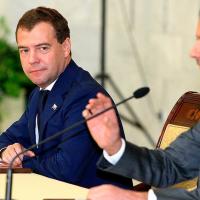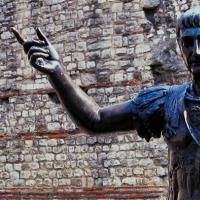Nikolai Karamzin
Nikolai Mikhailovich Karamzin is a famous Russian writer and historian, famous for his reforms of the Russian language. He created the multi-volume "History of the Russian State" and wrote the story "Poor Lisa". Nikolai Karamzin was born near Simbirsk on December 12, 1766. The father was retired at the time. The man belonged to a noble family, which, in turn, came from the ancient Tatar dynasty of Kara-Murza.
Nikolai Mikhailovich began to study in a private boarding school, but in 1778 his parents sent the boy to the boarding school of Moscow University professor I.M. Shaden. Karamzin had a desire to learn and develop, therefore, for almost 2 years, Nikolai Mikhailovich attended the lectures of I.G. Schwartz in an educational institution in Moscow. Father wanted Karamzin Jr. to follow in his footsteps. The writer agreed with the parental will and entered the service in the Preobrazhensky Guards Regiment.

Nicholas was not a military man for long, he soon resigned, but he learned something positive from this period of his life - the first literary works appeared. After his resignation, he chooses a new place of residence - Simbirsk. Karamzin at this time becomes a member of the Golden Crown Masonic lodge. Nikolai Mikhailovich did not stay long in Simbirsk - he returned to Moscow. For four years he was a member of the Friendly Scientific Society.
Literature
At the dawn of his literary career, Nikolai Karamzin went to Europe. The writer met with, looked at the Great French Revolution. The result of the trip was "Letters from a Russian Traveler". This book brought fame to Karamzin. Such works had not yet been written before Nikolai Mikhailovich, therefore philosophers consider the creator to be the founder of modern Russian literature.

Returning to Moscow, Karamzin begins an active creative life. He not only writes stories and short stories, but also manages the Moscow Journal. The publication published works by young and famous authors, including Nikolai Mikhailovich himself. During this period of time, “My trifles”, “Aglaya”, “Pantheon of foreign literature” and “Aonides” came out from under the pen of Karamzin.
Prose and poetry alternated with reviews, analyzes of theatrical productions and critical articles that could be read in the Moscow Journal. The first review, created by Karamzin, appeared in the publication in 1792. The writer shared his impressions of the ironic poem Virgil's Aeneid, Turned Inside Out, written by Nikolai Osipov. During this period, the creator writes the story "Natalya, the boyar's daughter."

Karamzin achieved success in poetic art. The poet used European sentimentalism, which did not fit into the traditional poetry of that time. No odes or, with Nikolai Mikhailovich, a new stage in the development of the poetic world in Russia began.
Karamzin praised the spiritual world of man, ignoring the physical shell. "Language of the heart" was used by the creator. Logical and simple forms, meager rhymes and the almost complete absence of paths - that's what the poetry of Nikolai Mikhailovich was.

In 1803, Nikolai Mikhailovich Karamzin became officially a historian. The corresponding decree was signed by the emperor. The writer became the first and last historiographer of the country. Nikolai Mikhailovich devoted the second half of his life to the study of history. Karamzin was not interested in government posts.
The first historical work of Nikolai Mikhailovich was "Note on ancient and new Russia in its political and civil relations." Karamzin presented the conservative strata of society, expressed their opinion on the emperor's liberal reforms. The writer tried to prove with creativity that Russia does not need transformations. This work is a sketch for a large-scale work.

Only in 1818 did Karamzin publish his main work, The History of the Russian State. It consisted of 8 volumes. Later, Nikolai Mikhailovich released 3 more books. This work helped bring Karamzin closer to the imperial court, including the tsar.
From now on, the historian lives in Tsarskoe Selo, where the sovereign gave him a separate apartment. Gradually, Nikolai Mikhailovich went over to the side of the absolute monarchy. The last, 12th volume of the "History of the Russian State" was never completed. In this form, the book was published after the death of the writer. Karamzin was not the founder of descriptions of the history of Russia. According to researchers, Nikolai Mikhailovich was the first to be able to reliably describe the life of the country.
“Everyone, even secular women, rushed to read the history of their fatherland, hitherto unknown to them. She was a new discovery for them. Ancient Russia seemed to be found by Karamzin, like America - ", - said.
The popularity of history books is due to the fact that Karamzin acted more as a writer than a historian. He respected the beauty of the language, but did not offer readers personal assessments of the events that happened. In special manuscripts for volumes, Nikolai Mikhailovich made explanations and left comments.
Karamzin is known in Russia as a writer, poet, historian and critic, but little information remains about Nikolai Mikhailovich's translation activities. In this direction, he worked for a short time.

Among the works is a translation of the original tragedy "", written. This book, translated into Russian, was not censored, so it was sent to be burned. Karamzin attached prefaces to each work, in which he assessed the work. For two years, Nikolai Mikhailovich worked on the translation of the Indian drama "Sakuntala" by Kalidas.
The Russian literary language changed under the influence of Karamzin's work. The writer deliberately ignored the Church Slavonic vocabulary and grammar, giving the works a touch of vitality. Nikolai Mikhailovich took the syntax and grammar of the French language as a basis.

Thanks to Karamzin, Russian literature was replenished with new words, including “attraction”, “charity”, “industry”, “love”. There was also a place for barbarism. For the first time, Nikolai Mikhailovich introduced the letter "ё" into the language.
Karamzin as a reformer caused a lot of controversy in the literary environment. A.S. Shishkov and Derzhavin created the Conversation of Russian Word Lovers community, whose members tried to preserve the "old" language. Members of the community loved to criticize Nikolai Mikhailovich and other innovators. The rivalry between Karamzin and Shishkov ended in a rapprochement between the two writers. It was Shishkov who contributed to the election of Nikolai Mikhailovich as a member of the Russian and Imperial Academy of Sciences.
Personal life
In 1801, Nikolai Mikhailovich Karamzin was legally married for the first time. The wife of the writer was Elizaveta Ivanovna Protasova. The young woman was a longtime lover of the historian. According to Karamzin, he loved Elizabeth for 13 years. The wife of Nikolai Mikhailovich was known as an educated citizen.

She helped her husband when needed. The only thing that worried Elizaveta Ivanovna was her health. In March 1802, Sofia Nikolaevna Karamzina was born, the daughter of a writer. Protasova suffered from postpartum fever, which turned out to be fatal. According to researchers, the work "Poor Lisa" was dedicated to the first wife of Nikolai Mikhailovich. Daughter Sophia served as a maid of honor, was friends with Pushkin and.
Being a widower, Karamzin met Ekaterina Andreevna Kolyvanova. The girl was considered the illegitimate daughter of Prince Vyazemsky. In this marriage, 9 children were born. At a young age, three descendants died, including two daughters of Natalia and son Andrei. At the age of 16, the heir Nikolai died. In 1806, a replenishment happened in the Karamzin family - Catherine was born. At 22, the girl married a retired lieutenant colonel, Prince Peter Meshchersky. The son of the spouses Vladimir became a publicist.

Andrey was born in 1814. The young man studied at Dorpat University, but then went abroad due to health problems. Andrei Nikolaevich resigned. He married Aurora Karlovna Demidova, but no children appeared in the marriage. However, Karamzin's son had illegitimate heirs.
After 5 years, replenishment happened again in the Karamzin family. Son Vladimir became the pride of his father. A witty, resourceful careerist - this is how the heir Nikolai Mikhailovich was described. He was witty, resourceful, reached serious heights in his career. Vladimir worked in consultation with the Minister of Justice, a senator. Owned the estate of Ivnya. Alexandra Ilyinichna Duka, the daughter of a famous general, became his wife.

The maid of honor was the daughter of Elizabeth. The woman even received a pension for being related to Karamzin. After her mother died, Elizabeth moved in with her older sister Sophia, who at that time lived in the house of Princess Catherine Meshcherskaya.
The fate of the maid of honor was not easy, but the girl was known as a good-natured and sympathetic, intelligent person. Even considered Elizabeth "an example of selflessness." In those years, photos were rare, so portraits of family members were painted by special artists.
Death
The news of the death of Nikolai Mikhailovich Karamzin spread around Russia on May 22, 1826. The tragedy occurred in St. Petersburg. The official biography of the writer says that the cause of death was a cold.

The historian fell ill after visiting Senate Square on December 14, 1825. The funeral of Nikolai Karamzin took place at the Tikhvin cemetery of the Alexander Nevsky Lavra.
Bibliography
- 1791-1792 - "Letters from a Russian Traveler"
- 1792 - "Poor Lisa"
- 1792 - "Natalia, the boyar's daughter"
- 1792 - "The Beautiful Princess and the Happy Karla"
- 1793 - "Sierra Morena"
- 1793 - "Bornholm Island"
- 1796 - "Julia"
- 1802 - "Martha the Posadnitsa, or the Conquest of Novgorod"
- 1802 - "My confession"
- 1803 - "Sensitive and cold"
- 1803 - "Knight of our time"
- 1816-1829 - "History of the Russian State"
- 1826 - "On Friendship"


